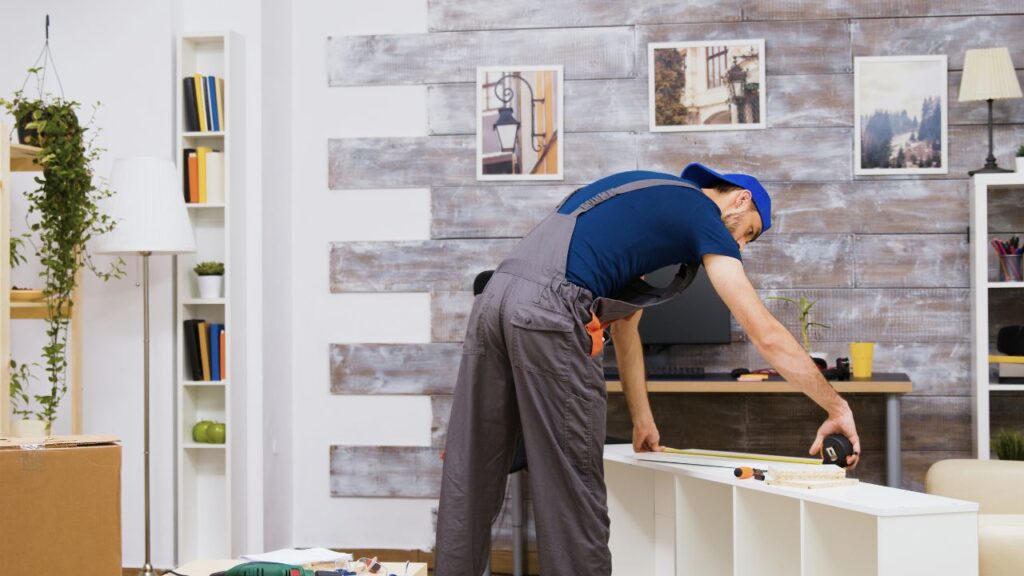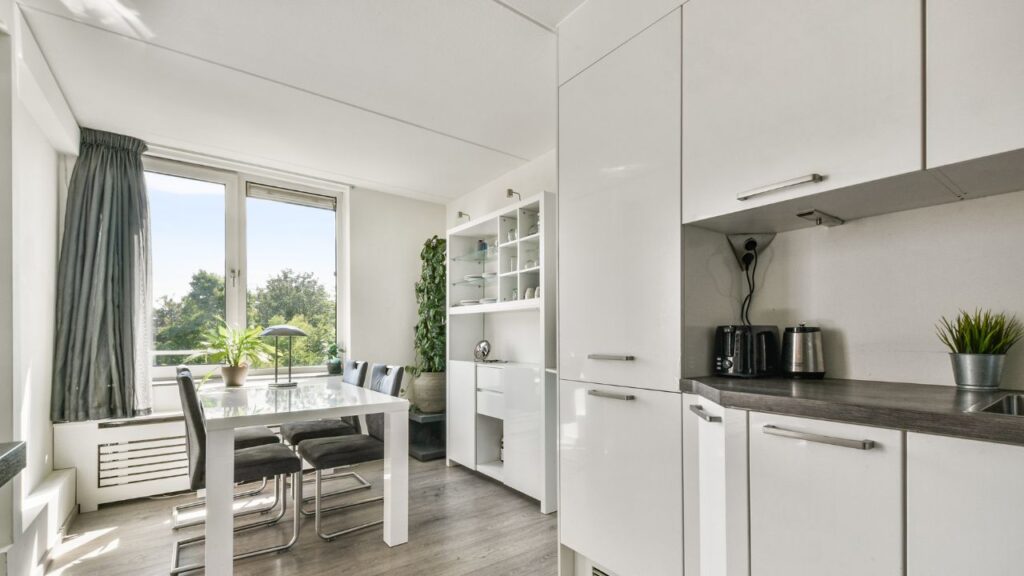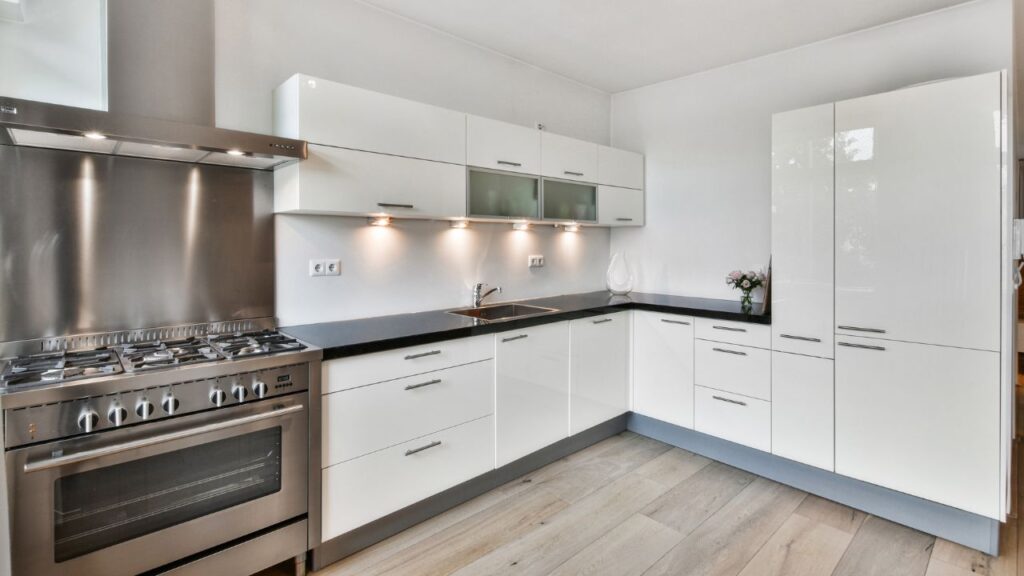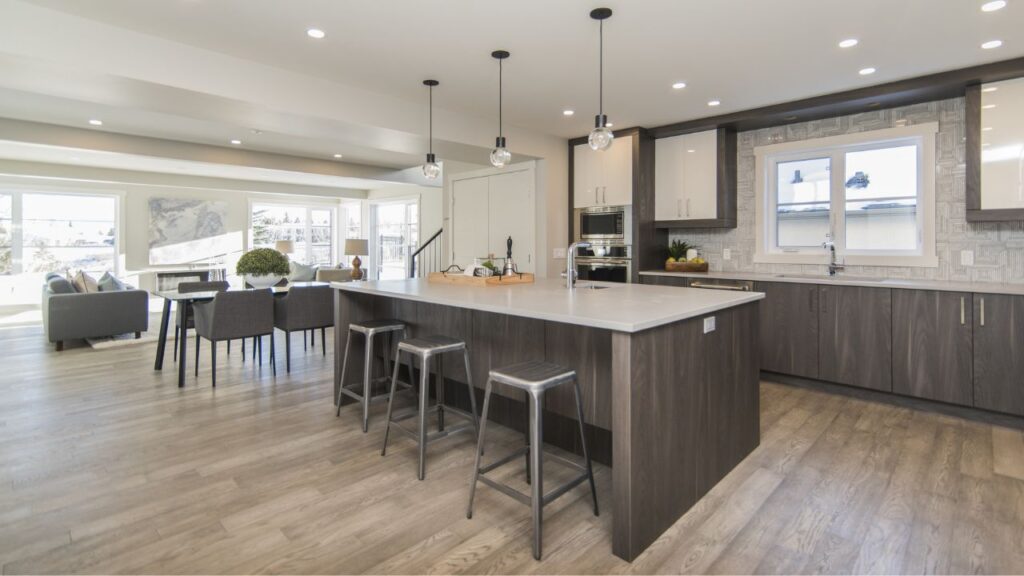A Wining Cost Estimate
That Helps You To Win More Cabinetry Construction Projects

Custom cabinetry gives homeowners a unique way to get personalized style and functionality in their homes. These cabinets are tailored to the homeowner’s needs, with a wide range of materials, finishes, and styles.
Maximizing space is a key benefit of custom cabinetry. Unlike stock cabinets, which come in set sizes, custom cabinets are made for your exact space. You can also add drawers, lazy Susans, and other features.
Custom cabinetry also offers higher quality than mass-produced options. The materials and craftsmanship are better, so they last longer.

Factors like material type, hardware choices, size and design complexity impact the cost of custom cabinetry in residential construction. An experienced contractor can help you make decisions and stay within your budget.
To estimate the cost of custom cabinetry in residential construction, you need to consider certain factors. In order to understand these factors better, this section will cover the three main sub-sections: materials, design and complexity, and size and quantity. Each of these factors plays a crucial role in the overall cost estimation of custom cabinetry.
Raw materials are a crucial element of custom cabinetry. Not only the aesthetics, but the strength and durability are affected by the type of material used. Plywood, MDF and solid wood are all common materials used in cabinetry. Plywood is lightweight and durable, but it can be expensive and contain harmful gases. MDF is affordable and resistant to humidity, but heavy and susceptible to swelling. Solid wood is strong with natural grain texture, but expensive. There are other options like particleboard and high-pressure laminates that can be chosen for specific requirements. Eco-friendly materials are also available and reduce environmental impact.
My client was delighted with their custom cabinetry made out of reclaimed wood in their cottage-style house. It looked stunning and added character. Custom cabinetry with intricate designs is like ordering a fancy latte – impressive, but costly.

Design and complexity can heavily influence custom cabinetry cost. Factors like material, design elements, size, quality, and special features all affect the pricing. To illustrate this, a table can be created with columns for those factors. Intricate designs will cost more due to the extra time and labour needed. A cabinet maker used advanced tech like laser cutting to maintain quality and speed up delivery, adding a premium price tag. Size also plays a role in the cost of custom cabinetry – it really does matter!
Not only does the quality of woodworking impact the price, but size and quantity do too. Let’s look at how they affect costs.
Size and quantity are key when designing custom cabinetry. Size has a big effect on pricing. The bigger the size, the more expensive it is. Costs can rise quickly if you need larger cabinets or many fittings.
Size | Quantity | Example Price |
|---|---|---|
3 ft wide by 6 ft tall cabinet | One | $500 |
6 ft wide by 8 ft tall cabinet | One | $1200 |
8 ft wide by 10 ft tall cabinet | One | $2000 |
It’s not only about size. Fewer cabinets can help you maintain style while keeping costs low. One client was stuck between wider cabinets or additional ones. We suggested wider cabinets, saving them $400!
Remember, wood is expensive – but it won’t judge your design choices!
To estimate the cost of materials for custom cabinetry in residential construction, you need to choose the right wood, hardware, and accessories. This will help you create accurate budget projections. Understanding the benefits of each type of material ensures that you choose not just the most cost-effective option but also the most appropriate one for your project needs.

When finding the right wood for your project, it’s vital to think about strength, durability, looks, and cost. See the Table below for different woods and their properties.
Wood Type | Strength | Durability | Aesthetics | Cost |
|---|---|---|---|---|
Pine | Low | Moderate | Rustic | Low |
Oak | High | High | Elegant | Moderate |
Cedar | Medium | High | Natural | High |
Also, some woods need special tools for shaping. For example, oak needs tungsten carbide or HSS blades because of its hardness.
You will select a wood to fit your needs and budget if you keep these factors in mind. Don’t make a wrong choice – it could cost you more to repair or replace it! Choose carefully!
The stuff you need to get a project done is known as “Hardware and Accessories“. Knowing the total expenditure for these items is essential for the project’s success.
Here’s a table of estimated costs of Hardware and Accessories:
Item | Quantity | Unit Cost ($) | Total Cost ($) |
|---|---|---|---|
Screws | 200 | 0.10 | 20.00 |
Bolts | 50 | 0.30 | 15.00 |
Nails | 300 | 0.05 | 15.00 |
Hinges | 4 | 3.00 | 12.00 |
Handles | 2 | 5.00 | 10.00 |
Bear in mind, extra costs such as taxes, shipping fees, and others related to location can affect the total price.
Also, it’s good to check different suppliers and see if they offer bulk discounts and compare prices online.
In conclusion, by being mindful of material expenses, making smart purchasing decisions, and using cost-saving techniques, we can maintain our budget and still get quality results. Calculating labor costs is like herding cats – it’s hard to predict and usually chaotic!

To determine labor costs in custom cabinetry for residential construction, you need to consider various factors. Factor in the specific project scope and timeline, as well as the skill level of the craftsman. These two sub-sections provide solutions for accurately estimating labor costs and formulating a budget for custom cabinetry in residential construction.
To measure a project’s size and time span, Project Scope and Timeline must be identified. Examining these factors is essential to decide how much labor is needed, how long it’ll take, and what resources are needed.
A table can show the info in a clear and useful way:
PROJECT PHASE | DURATION (in days) |
|---|---|
Planning | 10 |
Design | 20 |
Development | 45 |
Testing | 15 |
Deployment | 5 |
External delays, unanticipated issues, or changes in priority must also be accounted for. Allocate extra time to make up for these things.
To regulate labor costs, outsource certain tasks or use automation where possible. Prioritizing essential and high-value tasks helps allocate resources efficiently and maximize output while minimizing expenses. Good communication and collaboration with the team also help complete the project on time and decrease redundant work hours.
Why pay a skilled worker when you can get an unskilled one for the price of a cup of coffee?
Craftsman’s Expertise in the Job
Estimating labor costs requires knowing a craftsman’s skill level. Highly-skilled workers can produce quality output faster, and this affects labor costs.
Skill level of craftsmen can be divided into 3 categories:
Skill Level | Average Labor Cost Per Hour |
|---|---|
Novice | $15-20 |
Intermediate | $22-27 |
Expert | $30+ |

Experts have more knowledge and technical abilities, which makes them more productive and reduces work errors.
When allocating a budget, remember to track costs to prevent underestimating cost or reducing output quality.
Don’t underestimate the importance of skill level when hiring craftsmen. Otherwise, you may end up paying more than necessary!
To cover all your bases while estimating the cost of custom cabinetry in residential construction, you need to factor in additional costs such as installation and assembly, as well as shipping and delivery charges. Without considering these costs, your initial estimate will fall short and lead to unexpected expenses later on.
Putting Together and Assembling Furniture
Assembling and installing furniture can be tedious. It needs time, effort, and patience. Knowing the challenges is important to avoid problems.
Here’s a 3-Step Guide:
Some furniture items may require special tools or professional services.
History of Furniture Assembly
Furniture assembly dates back centuries. People used wooden planks and primitive supports. Or fabric around poles as beds or seating. Since then, there have been huge advances. Technical requirements needed by professionals.

The ‘Delivery and Shipping Costs’ is a certain amount charged for smooth product delivery. These charges depend on factors such as distance, weight, and delivery time. Here’s a table for the charges:
Zone | Distance (km) | Weight (kg) | Delivery Time (Days) | Cost ($) |
|---|---|---|---|---|
Local | 0 – 50 | 0 -20 | 1-2 | 10 |
National | 51 – 500 | 21 -50 | 3-4 | 25 |
International | Above 501 | Above 51 | 5-7 | 50 |
It is important to remember that special handling may add extra costs. For example, hazardous materials may need licensed professionals, thus increasing delivery costs.
One customer bought weight-lifting equipment that was outside the standard weights and sizes. This meant we had to pay for high packaging and shipping, making the transaction expensive.
Money is important, but custom cabinetry adds sweet touches to your home’s design.
To better finance your custom cabinetry project, learn how to set a realistic budget and explore your financing options. Setting a realistic budget will ensure you don’t overspend, while exploring financing options can help make your dream project a reality. This section of “A Comprehensive Guide to Estimating the Cost of Custom Cabinetry in Residential Construction” with its sub-sections, “Setting a Realistic Budget” and “Financing Options” will provide solutions to help you finance your custom cabinetry project.
Money-manage your tailor-made cabinets! Consider the cost factors: materials, size, labor. Prioritize your needs to budget better. Other charges may arise, so plan for contingencies. Add personalized touches without going over budget. The average cost is $5,142. Financing can help when it comes to custom cabinetry.

Folks searching for assistance with funding their custom cabinetry projects have plenty of financing options available. Here are some to consider:
Note that great credit is often a must, and high interest rates or fees could apply. Before committing to a loan, research lenders and understand all terms.
Prior to applying for funds, create a clear budget and plan that outlines project costs, timelines, and milestones. This info helps lenders assess risks and evaluate loan eligibility.
Don’t let financing issues stop you from realizing your dream space. Take the first step today and explore different financing options for custom cabinetry. Or, save money by using cardboard boxes – just remember to label them!
To save money on your residential construction custom cabinetry project, you can follow a few tips. With “Tips for Saving Money on Custom Cabinetry Projects” in the “A Comprehensive Guide to Estimating the Cost of Custom Cabinetry in Residential Construction” article, you’ll learn the benefits of buying materials in bulk, choosing simple designs with fewer accessories, and hiring local craftsmen.
When it comes to custom cabinetry, less is more – unless you’re charging by the accessory! Buying materials in bulk for your project is cost-effective. It gives you a discount from the supplier and minimizes transport costs. Plus, it reduces packaging waste.
Before making a purchase, consider expiration dates and storage requirements. Also, ask about the supplier’s return policy and make sure local zoning regulations approve buying in such quantities.
A professional carpenter once shared his story of completing a custom cabinetry project using costly lumber and hardware. He learned that buying too much reduced his expenses. The savings were so great, he got another similar woodworking project afterwards!

A great way to economize custom cabinetry is to use restrained designs with fewer adornments. For instance, avoid exotic woods and intricate patterns. Also, opt for fewer handles, drawer knobs, and hinges. Furthermore, select cabinet doors that don’t require complicated routing or carving. Lastly, don’t go for customized compartments – they may cost more if you want to modify them later.
Additionally, simpler designs have other advantages. Cleaning and maintenance are easier and the room aesthetic is less fussy. Also, there is more stability so customers can be certain of their purchase. Instead of vanity items, prioritize features that are efficient and beneficial in the long run.
Before you make a decision, get quotes from different cabinet makers on alternate end-user options. This way, you can achieve your goals with what fits your budget. Lastly, support your local craftsmen – they might let you pay with hugs and baked goods!
Time to put that saved money towards therapy for all the stress of assembling your own cabinets! Embark on custom cabinetry projects and find the right craftsmen. Local artisans provide personalized attention and quality work.
Connect with these skilled professionals and get a more customized finish. Research local craftsmanship online and gain unique skill sets. Enjoy lower rates than mass-produced items.
Hiring local artisans supports small businesses and gives an enhanced finished product. Don’t miss out on the chance to elevate your cabinetry project!
We’ve gained an overview of the cost of custom cabinetry for residential construction. Now it’s time to move forward with our plan to meet your needs. Here are some key points and steps to consider:
Also, keep all the necessary documentation ready such as drawings, specs and permits to streamline the process. Stay alert for potential delays or challenges that could happen during the construction process.
Be mindful of each detail of custom cabinetry installation to ensure it’s successful. Be aware of any extra costs or change orders that could occur and make sure they stay within budget.
Remember that even small changes can have a big impact on the cost, so pay attention to this.
Finally, Houzz & Home renovations’ 2018-19 Kitchen Trends Study says that customizing is essential for homeowners who plan to stay long-term.
Several factors affect the cost of custom cabinetry in residential construction, including the type of materials used, the complexity of the design, the size and layout of the space, and the level of customization required.
The best way to obtain an accurate estimate for custom cabinetry is to consult with a reputable custom cabinetry contractor who can assess the specific project requirements, including materials, design, and installation needs, and provide a detailed estimate based on those factors.
Yes, there are a few ways to save money on custom cabinetry. For example, choosing more affordable materials, opting for simpler designs, and using pre-built cabinets or semi-custom options can help reduce costs while still achieving a custom look.
The most popular materials used in custom cabinetry include hardwoods like maple, cherry, and oak, as well as engineered wood products like MDF, particleboard, and plywood. Other materials like metal and glass may also be used for certain design elements.
The timeline for custom cabinetry in residential construction varies depending on the scope of the project, the availability of materials, and the contractor’s workload. However, typically, the design and fabrication process can take anywhere from 4-8 weeks, with installation taking an additional 1-2 weeks.
Choosing the right custom cabinetry contractor involves doing research, checking references, and reviewing their portfolio of past work. It’s also important to ensure they are licensed and insured and have experience working on projects similar in scope and scale to yours.
Here I am going to share some steps to get your cabinetry construction cost estimate report.
You can send us your plan on info@estimatorflorida.com
Before starting your project, we send you a quote for your service. That quote will have detailed information about your project. Here you will get information about the size, difficulty, complexity and bid date when determining pricing.
We do cabinetry construction cost estimating and prepare a detailed report for your project. At last, you finalize the report and finish the project.
561-530-2845
info@estimatorflorida.com
Address
5245 Wiles Rd Apt 3-102 St. Pete Beach, FL 33073 United States
561-530-2845
info@estimatorflorida.com
Address
5245 Wiles Rd Apt 3-102 St. Pete Beach, FL 33073 United States
All copyright © Reserved | Designed By V Marketing Media | Disclaimer